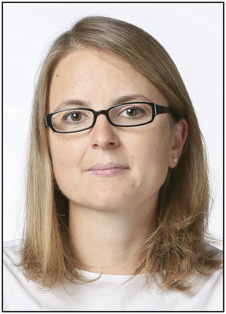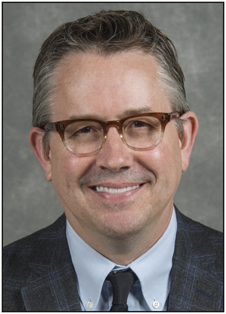The Meeting chairs for the 2019 Materials Research Society (MRS) Fall Meeting are Bryan D. Huey (University of Connecticut, USA), Stéphanie P. Lacour (École Polytechnique Fédérale de Lausanne, Switzerland), Conal E. Murray (IBM T.J. Watson Research Center, USA), Jeffrey B. Neaton (University of California, Berkeley, and Lawrence Berkeley National Laboratory, USA), and Iris Visoly-Fisher (Ben-Gurion University of the Negev, Israel). The Meeting will be held December 1–6, 2019, in Boston, Mass.
Bryan D. Huey is a professor and the head of the Department of Materials Science and Engineering at the University of Connecticut (UConn). He earned a BS degree from Stanford University, MS and PhD degrees from the University of Pennsylvania, and worked as a postdoc at Oxford Materials and the National Institute of Standards and Technology before joining UConn in 2004. He is an expert in the development and application of advanced variations of atomic force microscopy (AFM). Using conventional, functional, high speed, and lately tomographic AFM, HueyAFM Labs investigates piezo-electrics, multiferroics, photovoltaics, semi-conductors, microelectromechanical systems, biological cells and tissue, and pharmaceutical coatings. He received the Fulrath Award from The American Ceramic Society in 2016, and was honored as an Outstanding Faculty Member in UConn’s Department of Materials Science and Engineering. Huey has co-chaired two MRS symposia, co-organ-ized Electronic Materials and Applications and US–Japan conferences, and served as the chair of the Basic Science Division of The American Ceramic Society.

Stéphanie P. Lacour holds the Bertarelli Foundation Chair in Neuroprosthetic Technology in the School of Engineering and is the head of the Laboratory for Soft Bioelectronic Interfaces at the École Polytechnique Fédérale de Lausanne (EPFL). She is also a full professor in microengineering and bioengineering at EPFL. She is a co-founding member and the current director of the EPFL Center for Neuroprosthetics. Lacour received her PhD degree in electrical engineering from the Institut National des Sciences Appliquées de Lyon, France, and completed postdoctoral research at Princeton University and the University of Cambridge. Her work seeks to advance fundamental concepts in human-made electronic systems applied to biology. Specifically, the focus is on designing and manufacturing electronic devices with mechanical properties close to those of the host biological tissue so that long-term reliability and minimal perturbation are induced in vivo, and truly wearable systems become possible. Lacour was elected as a 2015 Young Global Leader by the World Economic Forum.

Conal E. Murray is a research staff member at the IBM T.J. Watson Research Center. He received a ScB degree in mechanics and materials science from Harvard University, a MS degree in mechanical engineering from Boston University, and a PhD degree in materials science and engineering from Northwestern University. He joined the IBM T.J. Watson Research Center in 2000. His work focuses on the micromechanics of semiconductor devices and the study of loss mechanisms in quantum computing. He is involved with the materials analysis project/group and the science and technology project/group. He has received four IBM Research Division awards and an Outstanding Symposium Paper Award at the 2009 MRS Spring Meeting. He has authored or co-authored more than 100 scientific publications and three book chapters, and holds more than 70 patents. Since 2012, Murray has served on the organizing committee of the Denver X-ray Conference and has chaired several symposia on diffraction and residual stress.

Jeffrey B. Neaton is a professor of physics at the University of California, Berkeley (UC Berkeley), where his research interests include developing and applying theories and novel computational methods to predict, understand, and control phase behavior and electronic phenomena in complex materials from first principles. He serves as the Associate Laboratory Director for Energy Sciences at Lawrence Berkeley National Laboratory (LBNL), overseeing the Chemical Sciences and Materials Sciences Divisions, as well as the lab’s two national scientific user facilities, the Advanced Light Source and the Molecular Foundry. He is also a senior faculty scientist at LBNL, the associate director of the Center for Computational Study of Excited-State Phenomena in Energy Materials at LBNL, and a member of the Kavli Energy NanoScience Institute at UC Berkeley. He received his PhD degree in physics from Cornell University and was a postdoctoral fellow at Rutgers, The State University of New Jersey. After working as a postdoc and staff scientist at the Molecular Foundry, he became director of the Molecular Foundry in 2013. Neaton is the recipient of a US Department of Energy Presidential Early Career Award for Scientists and Engineers, and is a Fellow of the American Physical Society.

Iris Visoly-Fisher is a senior lecturer with the Department of Solar Energy and Environmental Physics at the Swiss Institute for Dryland Environmental and Energy Research and the Blaustein Institute for Desert Research at Ben-Gurion University of the Negev, Israel. She received her BSc and MSc degrees in materials engineering and a BA degree in physics from the Technion–Israel Institute of Technology. She completed her PhD degree in materials and interfaces at the Weizmann Institute of Science in 2004, studying single grain boundaries in polycrystalline CdTe solar cells. She was a postdoctoral fellow at Arizona State University, where she studied electrochemical potential-dependent current transport in single biomolecules. She joined Ben-Gurion University of the Negev as an assistant professor in 2008. Her current research interests include materials for solar-energy conversion and storage, optoelectronics, and surface science. She is an executive committee member of the Israel Vacuum Society, an editorial board member of the journal Scientific Reports, and a MRS member since 2000.



